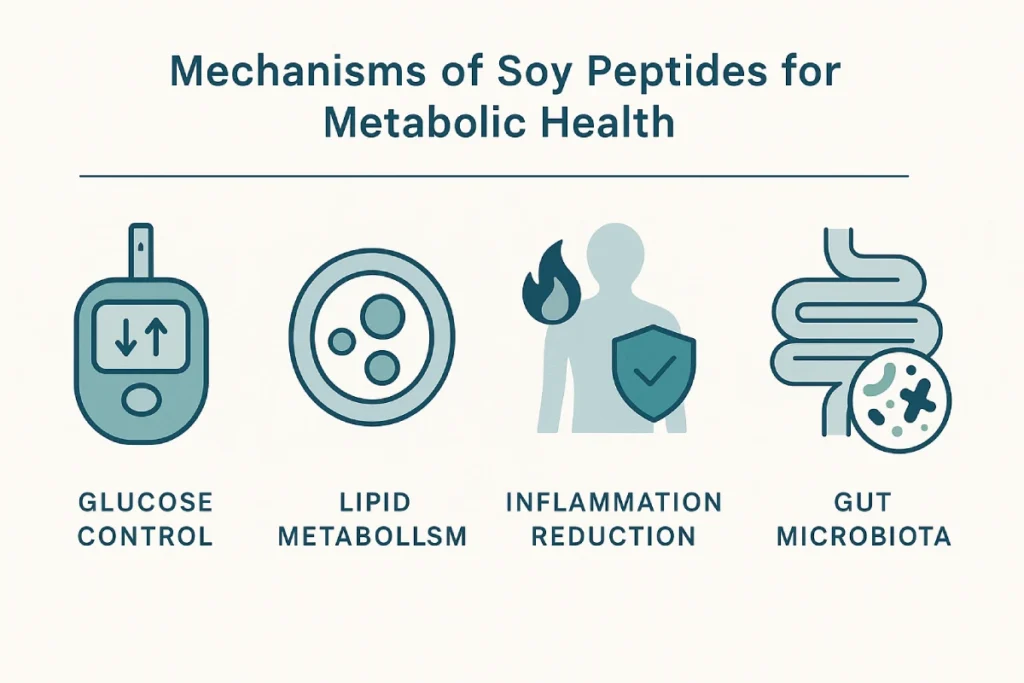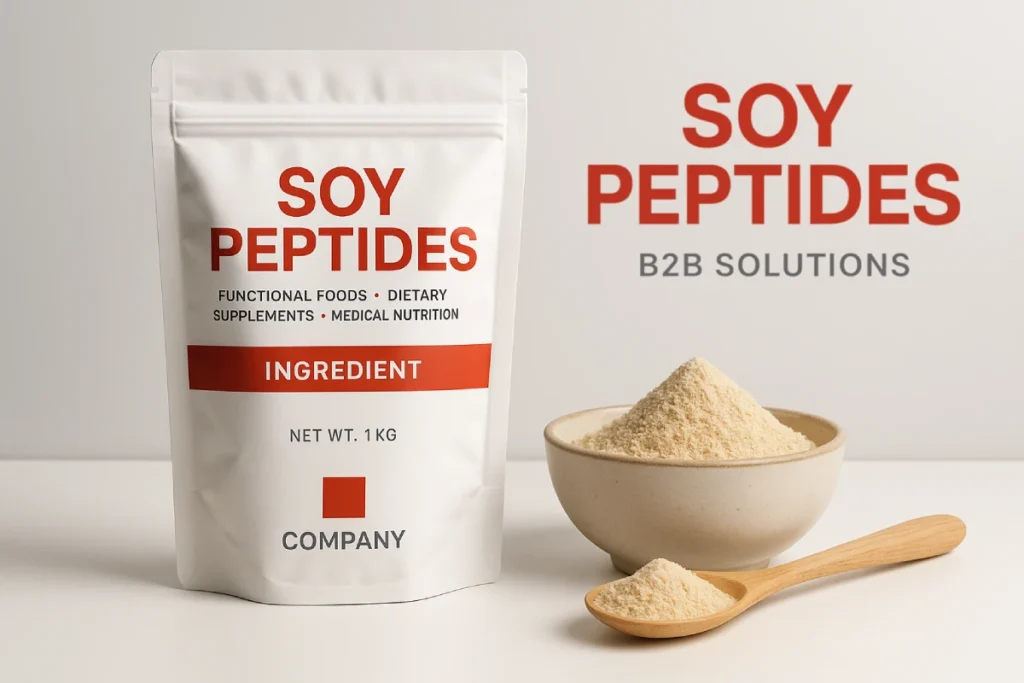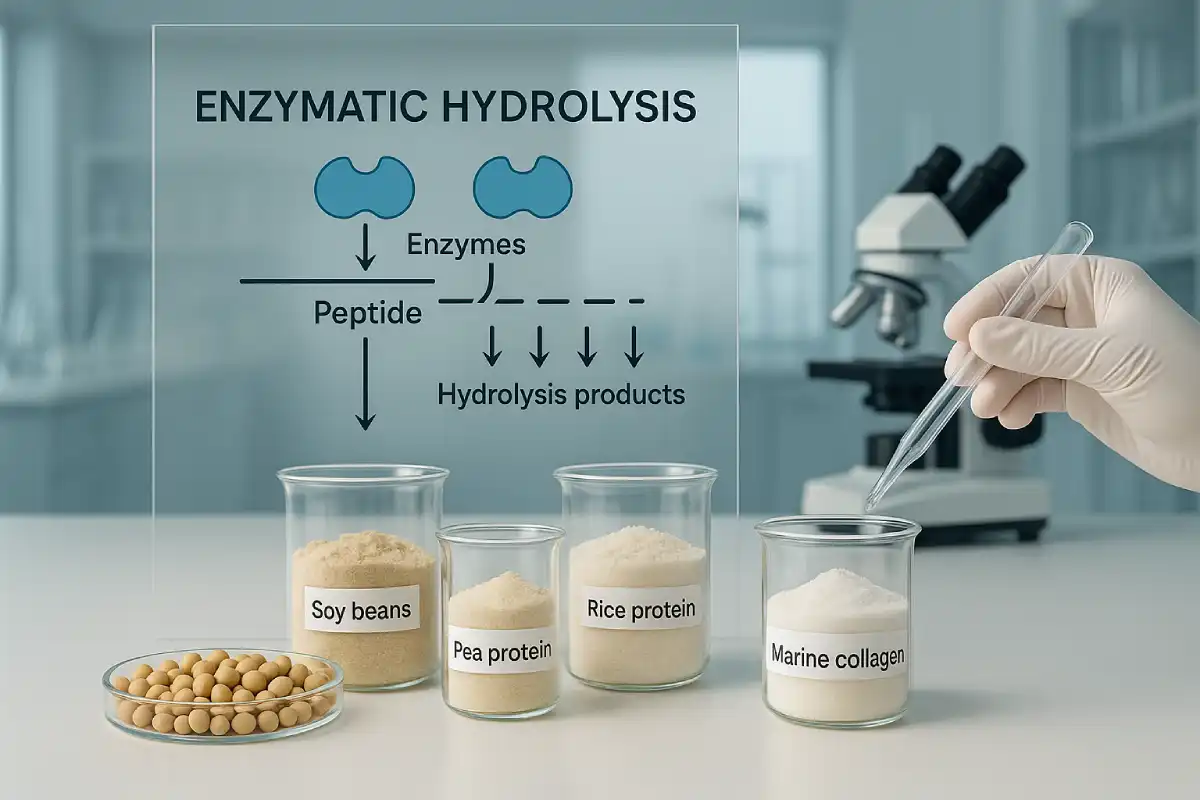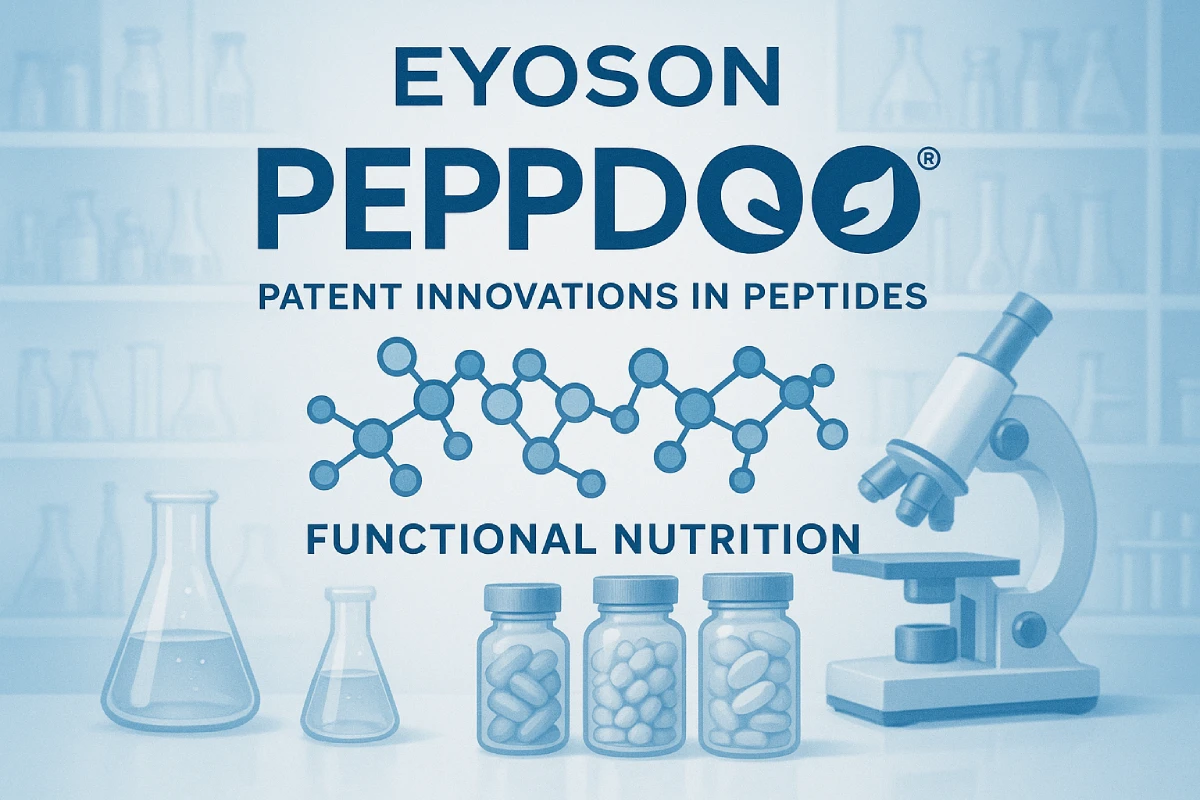The Rising Demand for Plant-Based Functional Peptides
Metabolic disorders such as obesity, diabetes, and dyslipidemia are among the most pressing global health concerns. According to the World Health Organization, more than 420 million people worldwide are living with diabetes, while obesity rates continue to rise across both developed and developing nations [1]. This escalating prevalence has stimulated demand for innovative nutritional solutions that are not only effective but also safe, natural, and sustainable.
In this context, plant-based peptides have emerged as a promising class of functional ingredients. Among them, soy peptides stand out due to their robust scientific validation, favorable amino acid composition, and versatile applications across functional foods, dietary supplements, and medical nutrition. For B2B stakeholders—procurement managers, R&D scientists, and marketers—the potential of soy peptides is no longer speculative; it is an actionable opportunity for product innovation and market differentiation.

What Are Soy Peptides? Functional Characteristics & Production
Soy peptides are short chains of amino acids derived from soy protein through controlled enzymatic hydrolysis or fermentation. Unlike intact soy protein, these peptides possess lower molecular weights—typically below 1,000 Da—allowing them to be absorbed more efficiently in the human body [2].
Key distinctions from soy protein:
- Higher Bioavailability: Peptides cross the intestinal barrier more efficiently than intact proteins.
- Targeted Functionality: Specific peptide fractions can interact with metabolic pathways, enhancing health benefits.
- Better Digestibility: Low molecular weight improves tolerance and reduces allergenic potential.
Manufacturing process:
Leading soy peptide manufacturers such as EYOSON® employ advanced enzymatic hydrolysis and fermentation systems, enabling precise control of molecular weight distribution and bioactivity. This ensures consistency, scalability, and compliance with international food and supplement regulations.
Scientific Mechanisms: How Soy Peptides Support Metabolic Health
Soy peptides are not merely nutritional fillers; they act as bioactive molecules with specific physiological effects. Key mechanisms include:
1. Regulating Blood Glucose
Soy-derived peptides have been shown to enhance insulin sensitivity, reduce postprandial glucose spikes, and regulate glucose uptake in cells [3]. By influencing enzymes such as α-glucosidase, soy peptides help delay carbohydrate absorption and improve glycemic control.
2. Improving Lipid Profile
Research indicates that soy peptides can reduce LDL cholesterol and triglyceride levels while promoting HDL cholesterol [4]. This lipid-modulating effect is critical for preventing metabolic syndrome and cardiovascular complications.
3. Reducing Inflammation & Oxidative Stress
Chronic low-grade inflammation is a hallmark of metabolic disorders. Certain soy peptide fractions inhibit pro-inflammatory cytokines and act as antioxidants, reducing oxidative stress markers [5].
4. Modulating Gut Microbiota
Emerging evidence highlights soy peptides’ role in promoting beneficial gut bacteria such as Lactobacillus and Bifidobacterium, which indirectly improves metabolic health and immune function [6].
Takeaway: The metabolic benefits of soy peptides are multi-layered—impacting glucose, lipid, inflammatory, and microbiome pathways simultaneously.
Successful Case Studies in Functional Nutrition
To illustrate real-world applications, consider the following success stories from different industries:
- Functional Beverage Brand (Asia): A major health drink company incorporated soy peptides into its meal-replacement beverages. The addition improved satiety and glycemic control, resulting in a 30% sales increase within one year.
- Supplement Brand (Europe): A leading nutraceutical brand launched “Plant-Based Metabolic Support Capsules” formulated with soy peptides and green tea extract. Positioned for weight management and energy balance, the product quickly became a top seller in pharmacy channels.
- Medical Nutrition Company (China): A clinical nutrition firm added soy peptides to diabetic nutrition powders. Clinical trials showed a significant reduction in glycemic index compared to conventional protein powders, supporting product adoption in hospitals and medical institutions.
These cases highlight soy peptides’ adaptability across product categories and confirm their market relevance for functional food, dietary supplements, and medical nutrition.
Application Opportunities Across Industries
Functional Foods & Beverages
Meal replacements, protein bars, energy drinks: Soy peptides enhance satiety, digestion, and glycemic control. Sports nutrition: Improved recovery and energy metabolism.
Dietary Supplements
Capsules, tablets, or powders with soy peptide concentrates. Often combined with plant extracts, fibers, or probiotics for synergistic benefits.
Medical Nutrition & Special Diets
Suitable for diabetic, obese, and elderly populations requiring tailored metabolic support. Added to specialized medical foods for hospital and outpatient care.
Plant-Based & Clean Label Products
Non-dairy, vegan-friendly, allergen-reduced: Soy peptides meet growing consumer demand for plant-based and clean-label formulations.

Why Partner with EYOSON® as Your Soy Peptide Manufacturer?
For B2B brands exploring soy peptides, supplier choice is critical. EYOSON® stands out as a reliable soy peptide supplier and manufacturer with the following advantages:
- Full-Range Peptide Manufacturer: From soy peptides to marine peptides and collagen peptides, covering the entire spectrum.
- Patent & Standards Leader: EYOSON® ranks among China’s leaders in small-molecule peptide patents and actively participates in industry standard-setting.
- Advanced Hydrolysis & Fermentation Technology: Ensures precise molecular weight control and stable bioactivity.
- B2B-Oriented Services: Offering OEM/ODM manufacturing, custom formulation support, clinical trial resources, and regulatory compliance assistance.
For procurement, R&D, and marketing teams, this means turnkey peptide innovation solutions from concept to commercialization.
Market Outlook: Plant-Based Metabolic Health on the Rise
The global plant-based functional food market is expected to grow at a 7–9% CAGR in the coming years [7]. Within this landscape, soy peptides offer a unique positioning:
- Science-backed: Supported by growing clinical evidence.
- Sustainable: Plant-based and eco-friendly sourcing.
- Versatile: Applicable across diverse industries.
For functional food, supplement, and medical nutrition companies, incorporating soy peptides represents a strategic innovation opportunity aligned with global consumer trends and clinical needs.
Why B2B Brands Should Choose Soy Peptides for Metabolic Health
Soy peptides represent more than just a plant-based protein fragment. They embody a next-generation functional ingredient with scientifically validated benefits for metabolic health. By improving glucose control, lipid metabolism, inflammation, and gut microbiota, soy peptides provide holistic support for addressing the global metabolic health crisis.
For B2B companies seeking differentiation, soy peptides are not only effective but also versatile and market-ready.
Partner with EYOSON® for Soy Peptide Solutions
Explore high-quality soy peptides with patented technology, customizable formulations, and full B2B support for functional foods, dietary supplements, and medical nutrition products.
Contact Us for Custom SolutionsFAQ
Soy peptides are usually produced in a range of 300–1,500 Da, which ensures rapid absorption and bioactivity. EYOSON® controls molecular weight precisely to meet different application needs such as glycemic control, lipid management, and gut health.
Soy peptides are available in powder or granule form, making them suitable for beverages, protein shakes, snack bars, capsules, and tablets. Their neutral taste and high solubility improve formulation flexibility.
EYOSON® provides a complete compliance package including ISO, HACCP, GMP, Halal, and Kosher certifications. We also assist B2B clients with clinical data, technical dossiers, and regulatory documents for faster market entry.
Soy peptides provide plant-based, allergen-friendly, and cholesterol-free alternatives with proven benefits for blood sugar, lipid metabolism, and inflammation management. For vegan and clean-label products, soy peptides are often the preferred choice.
In addition to high-quality soy peptide production, EYOSON® offers custom formulation (OEM/ODM), application testing, stability studies, and product innovation consulting to help partners shorten R&D cycles and accelerate commercialization.
Yes. For example, Japan and South Korea have launched soy peptide-based functional beverages targeting blood sugar control, while European nutraceutical companies use soy peptides in metabolic syndrome management supplements. EYOSON® has partnered with several brands to bring similar innovations to market with strong consumer acceptance.
References
- World Health Organization. (2021). Diabetes.
- Li, H., & Yu, C. (2020). Soy-derived bioactive peptides and their health benefits: A review. Food Science & Nutrition, 8(10), 5206–5220.
- Liu, J., & Chang, S. K. (2011). Soy protein hydrolysates reduce serum glucose in diabetic mice. Journal of Agricultural and Food Chemistry, 59(13), 6739–6744.
- Duranti, M. (2006). Grain legume proteins and nutraceutical properties. Fitoterapia, 77(2), 67–82.
- Lammi, C., Zanoni, C., & Arnoldi, A. (2015). Peptides derived from soy and lupin proteins modulate cholesterol metabolism. Journal of Functional Foods, 15, 36–47.
- Wang, Y., & Wang, J. (2019). Effects of dietary soy peptides on gut microbiota composition and metabolic health. Nutrients, 11(9), 2148.
- Grand View Research. (2023). Plant-based protein market size, share & trends report.





